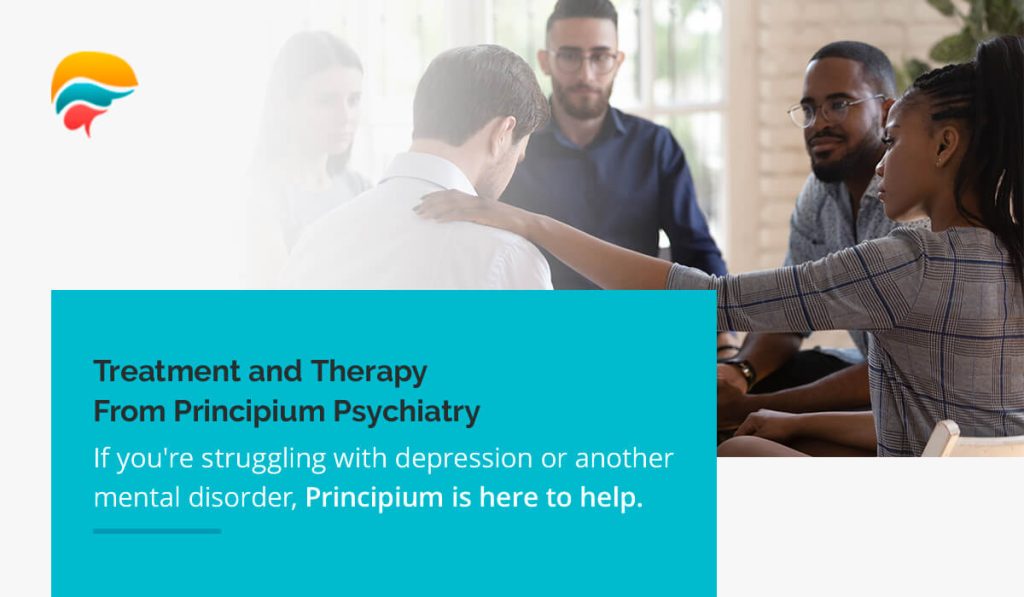If you’re living with depression, you’ve likely noticed an impact on your quality of life. Symptoms such as mood swings, hopelessness and apathy make it challenging to achieve daily tasks and maintain personal connections. For some people, depression makes it hard to get out of bed in the morning, impacting their work, school and social relationships.
The good news is that many treatments are available for clinical depression. Both antidepressant drugs and psychotherapy can help you improve your symptoms and regain your sense of self-worth. Continue reading to learn about some of the best antidepressant brands, the potential side effects and how combining medication and therapy can bring you relief from your symptoms.
If you start taking antidepressant medications to treat depression, your provider will give you information regarding the specific medication’s potential side effects and interactions. Note that antidepressants can interact with other medications, alcohol and substances. Therefore, your physician will try to prescribe medications with the least side effects and interactions with your other medications or medical conditions.
While you’re on antidepressants, your doctor will monitor you closely for unusual or severe side effects. If you experience harmful side effects, your provider can help you switch medications and try something new. While the side effects can vary with each type of medication, some are more common. When you start taking antidepressants, you might experience:
These side effects are mild in most cases, and many will start to go away the longer you take the medication. If you’re concerned about a particular side effect or interaction, talk with your doctor to see what other options are available.
As with any medication, antidepressants come with certain risks. Your physician should discuss the risks with you in detail, so you’re aware of what you might expect. The common side effects of antidepressants are usually mild, but a few individuals may experience more moderate to severe side effects or risks, such as:
While taking antidepressants, your doctor will monitor you to determine if you’re developing any harmful or concerning symptoms. If you develop any of these side effects, your doctor may switch medications or slowly reduce your intake. It’s essential not to stop taking your medication abruptly due to withdrawal symptoms. Your doctor can help you slowly decrease your dose until you’re no longer taking the medication.
In most cases, your provider won’t prescribe antidepressants unless the benefits outweigh the risks. Antidepressants are well-studied and approved by the Food and Drug Administration (FDA), meaning they’ve undergone rigorous testing and clinical trials. These medications are safe for the vast majority of people and have many benefits, including:
Being aware of the risks and benefits of antidepressants can help you make an informed decision before you start taking any medication. If a particular symptom or risk concerns you, be honest with your doctor and let them know how you’re feeling. Together, you can find a medication that works and improves your depression symptoms.
Antidepressants work by rebalancing chemicals in the brain, particularly serotonin. There are multiple types of meds for anxiety and depression treatment, and each affects the chemicals in your brain differently. Popular antidepressants include:
Your doctor may prescribe multiple antidepressants at once. They may also prescribe other medications to help enhance the effects of one of the medications above.
While antidepressants can do a lot to improve depression symptoms, additional treatment may be necessary to enhance your quality of life. Therapy can be an excellent combination with antidepressants. Research shows that combining therapy with antidepressants is more effective at treating mental health conditions than using antidepressants alone, including depression, panic disorder and obsessive-compulsive disorder (OCD).
Taking antidepressants can make you more receptive to therapy, as well. Depression can create feelings of apathy, which can make someone less likely to engage in activities, including therapy. Antidepressants can improve your mood, so you can start psychotherapy and address any underlying causes of your mental health conditions.
Talk with your doctor about starting therapy while taking antidepressants. Many people find vast improvements in their mood and quality of life when these treatments are combined. There are multiple types of therapy available for people taking antidepressants, including:
While many people experience similar symptoms, depression affects everyone differently. One type of therapy might be more effective for one person than another. When you work with a therapy provider, they’ll help you determine what therapy model would best suit your needs. A tailored approach is the best way to improve your symptoms and quality of life.

If you’re struggling with depression or another mental disorder, Principium is here to help. Principium specializes in the treatment of various mood and anxiety disorders. We offer multiple treatment options to help you overcome your symptoms and restore balance to your life. We combine psychotherapy with medication treatment to give you the best chance of success and accelerate your recovery.
Our treatments are tailored to your needs, so you can rest assured you’re getting the best treatment possible. All members of our team are patient-focused and dedicated to their practice. If you’re struggling with your mental health, the best way to improve your symptoms and quality of life is to seek professional treatment.
Contact us today to learn more about our treatment programs or schedule an appointment.